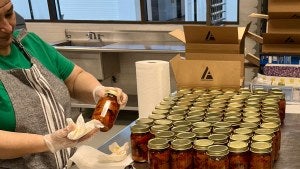Incubator helps entrepreneurs bring international flavors—and businesses—to Chicago

At The Hatchery, many of the entrepreneurs are recent immigrants building businesses based on family recipes, which comes with a unique set of challenges—but plenty of opportunity.
Mohammad Khan’s mom mostly made achaar – a pickled Indian condiment with garlic, lemon, and sour mango – for her friends in small batches of 25 jars at a time. When she got a call from one of those friends asking for 100 jars to stock in his grocery store on Devon Avenue, Khan’s first thought was, “I don’t think it’s legal to do this, Mom.”
His second was, “If there’s demand, maybe we start getting into it.”
Khan started Googling. He realized he needed licenses and certificates, and eventually a commercial kitchen, if he wanted to sell his family’s achaar.
That’s when Khan and his older sister Yesrab Khanam toured The Hatchery’s 67,000-square-foot facility in Garfield Park. The non-profit business incubator opened in 2018 to help Chicago entrepreneurs like Khan and his sister start businesses in the food and beverage industry, and it leases shared and private commercial kitchen spaces at discounted rates for aspiring founders – or for free to West Side residents.
Like Khan, many of The Hatchery’s clients are recent immigrants or the children of immigrants who have built businesses based on family recipes or the home-cooked staples they grew up with. For these entrepreneurs, bringing new flavors to Chicago is a business opportunity, but it comes with a unique set of challenges.
Flying the nest
“The West Side of Chicago has been traditionally a very under-invested neighborhood,” Hatchery chief strategy officer Natalie Shmulik told ChicagoGlobal. At the same time, Shmulik said her team also saw “a budding group of entrepreneurs and job seekers eager to participate in the community.”
Shmulik points out that, because many jobs in the food and beverage industry don’t require a college degree, they can be more accessible for many workers. Still, there are plenty of other challenges, including small margins, liability, and a long list of certifications and licensing needed for new businesses.
“We’re here to help with that,” she adds.

Khan’s mother Jahanara Begum makes her achaar in The Hatchery’s shared kitchen space.
The Hatchery estimates that the incubator and its members created about 154 jobs last year and that its businesses earned over $900,000 in revenue. Roughly 30 businesses move into the incubator’s kitchen spaces each year, and about half graduate into spaces of their own.
The goal, Shmulik explains, is to help founders develop their business idea, decide whether or not they want to pursue it, and, if so, to help them find stable footing and their own space in one to five years.
Supply chain challenges
For some of these entrepreneurs, sourcing just the right ingredients can be expensive or impractical.
Khan and his sister have leased kitchen space at The Hatchery for a little over a year now, and they named their achaar company Begumz – their mother’s maiden name. Of Begumz’s three types of achaar, the sour mango flavor has been the most difficult to find ingredients for.
Before introducing the product, Khan and his sister bought dozens of mangoes only to find half were too sweet for their achaar recipe.
“They can’t be ripe,” explained Khan. Instead, they need to be “really, really sour: if you bite into it, it is like a Warhead.”
For months, every time Khan saw a green mango he’d pick it up and ask his mother if it would work for their recipe.
“No, taste it,” she’d say. “So sweet.”
It was expensive, he said, but especially frustrating because sour mangoes are a common ingredient in India that’d be available at “any local market,” said Khan.
Other Hatchery founders have run into similar problems. Yuta Katsuyama and his co-founder Cristina Tarriba started OnigiriKororin to sell onigiri – a popular Japanese rice snack wrapped in seaweed and stuffed with protein fillings, often fish.
“It’s hard to find cheap enough ingredients,” Katsuyama told ChicagoGlobal. “All the [shipping] containers from Japan [go] to Hawaii and California and New York.” Shipping those imports in from the coasts makes his product more expensive.
For some founders, Chicago’s international grocery stores have been essential for sourcing ingredients.
Husband-and-wife team Byron Gully and Stacy Seuamsothabandith founded Laos To Your House – one of the only businesses in the city serving Laotian food.
“Lime leaves, lemongrass, galangal – everything that we source, we actually go up to Vietnamese Town [on Argyle Street in Uptown] every single week to buy those ingredients,” Seuamsothabandith said.
At Begumz, Khan and his sister have built a relationship with Patel Brothers, a South Asian grocery store on Devon. They’ve asked the owners to call them when fresh mangoes come in so they can find the sourest in the bunch.
"What is it?"
Finding the ingredients to make the food is one thing, but teaching people what to do with it is another.
Katsuyama’s onigiri is wrapped in a triangle with two layers of plastic: one covers the seaweed, while the other separates the seaweed from the rice to keep everything crispy.
“That’s good,” he said, “but one thing is, people don’t check the instructions [for] how to open the package.” Instead, they open it from the back and the onigiri falls apart.
Laos To Your House founders Gully and Seuamsothabandith created a video series called “You Got Lao’d” to explain how to eat (and how not to eat) the food on their menu, and their deliveries include QR codes with tips for customers.
“For me, as a Lao person, I want you to experience it the right way, because I want to blow [your] mind,” Stacy said.
Stacy intentionally wrote her menu to reflect terms that are familiar to Western customers, with items like a “LAOcuterie Board” and beef jerky, in the hopes that the language “lowers the barriers of entry…for people to experience the authentic Lao cuisine,” she said.
At farmers’ markets, Khan relies on free samples to teach his customers how to use Begumz achaar. He begins by describing how his family ate it growing up.
Then, he said, he tells them that “this [product] is so new that I don’t even know what people are going to use it for, and we’re looking for feedback.”
When people on Instagram told Khan they were putting Begumz achaar on their eggs, he was surprised, but now he does it too.
Chicago's advantage
“Within the Indian community, I think Begumz is kind of a known-ish product at this point,” said Khan. South Asian grocery stores buy Begumz and regularly sell out.
But for Khan and other founders, reaching the much larger market of Chicagoans who don’t already know the product is difficult.
That challenge is part of the city’s appeal for Katsuyama, who dreams of making onigiri as popular as sushi or ramen in the U.S.
“If we can [find] success in Chicago, it’s easier to [find] success in other cities in the U.S. Not like California or New York – those are easier markets for Japanese food because they [have] more Asian population [and] Japanese workers from Japan.” Sourcing ingredients, he adds, is also easier and cheaper in those markets, but Katsuyama says that, if he can make his business work in the more challenging Illinois market, he can make it work in other states too.
For Laos To Your House, Chicago was an opportune market because Seuamsothabandith believed it was “a foodie city.”
“People are open to trying a new cuisine,” she said.
Where founders find success
For Seuamsothabandith, success is introducing people to Laotian culture, and it’s a deeply personal mission.
“Growing up, I got asked the question all the time, ‘Oh, what ethnicity are you?’” When she answered “Lao,” she said, few people knew about the country. “Why is Laos forgotten?” she asked. In her experience, serving Laotian food is “the first and easiest route to get that exposure.”
Similarly, while Khan hopes that Begumz is one day the Heinz of achaar, he describes that goal as “kind of selfish.” He’d also be happy if more people just learned what “achaar” is – even if they don’t immediately associate it with Begumz.
“The true success that I would say my mom is looking for is that people get to try that flavor – which is from our homeland,” he said.
“Nobody knows what it is, and it offers a lot to the palate.”
This story first appeared in the ChicagoGlobal newsletter, a joint project of Crain's Chicago Business and the Chicago Council on Global Affairs.

